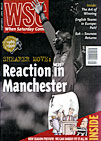 Craig McDowall pays tribute to former Rangers manager Jock Wallace
Craig McDowall pays tribute to former Rangers manager Jock Wallace
Jock Wallace was relatively unknown outside of his native Scotland. However, Rangers fans the world over greeted the news with a mixture of sadness and regret.
Publicly, Wallace appeared dour and serious but he was a man of great compassion and integrity, capable of inspiring those who worked with him. The Protestant work ethic was evident in all his sides, but he liked his teams to play with skill and flair – it was Wallace who introduced probably the most skilful Scottish player of his generation, Davie Cooper, to the Rangers side.
Wallace, in common with many great managers, had a relatively unaccomplished playing career. A goalkeeper, the highlight of his playing career came when as player-manager of Berwick Rangers he led them to a Scottish Cup victory over the club that was to figure so much in his later life, Glasgow Rangers.
Wallace joined Rangers in 1970 as coach under the then manager Willie Waddell, a period when Celtic were in the ascendancy, in Europe as well as in Scotland. Wallace’s training methods were legendary. Whereas the current crop of Rangers’ players take themselves off to a training camp in the Italian Alps, for their 1970’s counterparts pre-season training consisted of pounding up and down the sand dunes at Gullane, a quiet seaside town outside of Edinburgh. When Wallace took over at Leicester, a club that couldn’t be further from the coast. he had a full size sand dune built in the club car park.
There must have been something in this regime as in 1972, under Waddell and Wallace, Rangers had their greatest ever victory, beating Moscow Dynamo to win the European Cup Winners’ Cup.
Shortly after this victory, Waddell moved upstairs with Wallace taking over. His new blend of youth and experience gelled in 1975 when Rangers broke Celtic’s nine season dominance of the Scottish League.
Better was to follow next year when Rangers won all three domestic trophies, a feat that was to be repeated two years later in 1978. Strangely, however, within a week of clinching his second treble in three years, Wallace was to leave the club.
The reasons for his departure have never been completely revealed. Wallace repeatedly turned down offers from tabloid newspapers to sell his story. The rumours at the time centred around the lack of funds for new players, an alien concept for today’s Rangers’ fans, and also on Rangers’ sectarian signing policy. Bizarrely, it seemed that Wallace had both wanted to sign Roman Catholic players and wasn’t allowed and that the board had tried to force him to sign a Catholic and he refused.
Whatever the reasons, Wallace left Rangers and Scotland for Leicester City, who he took to promotion to the old First Division in 1980.
Three years later, Wallace’s successor as Rangers manager, John Grieg, resigned. After Alex Ferguson and Jim McLean had declined the job, Jock was invited back.
Ever the traditionalist, Wallace reinstated the quintessential black and red stockings to the Rangers strip for his first game in charge against Aberdeen. A seemingly meaningless change, but a gesture understood by all Rangers fans. Jock was back.
Unfortunately, it wasn’t as easy to recapture the successes of his first period in charge. Two League Cup wins in 1984 and 1985 were not enough to satisfy Rangers success-hungry supporters. A new multi-million pound stadium was regularly hosting attendances of fewer than 10,000 people.
Wallace’s last game in charge at Ibrox saw Rangers taken to pieces by Spurs in a meaningless friendly. The following day he was sacked and the Rangers revolution started with the appointment of Graeme Souness. Whether Wallace would have achieved anything like the success of Souness given the same financial backing is a subject that is still debated in the bars of Glasgow.
Wallace went to Spain, where initially he managed Sevilla and where he later retired, the climate helping to ease the symptoms of Parkinson’s disease, from which he was now suffering.
Jock Wallace was certainly a man of his times, but above all he will be remembered by Rangers fans as a man of the people, a sentiment testified by the ovations he received on his infrequent returns to Ibrox in recent years.
From WSC 115 September 1996. What was happening this month